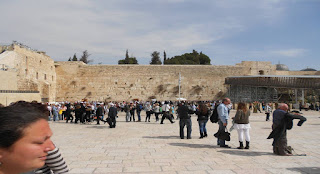In anticipation of Sam's arrival and his first few days on this earth, I was stoked. I dreamed of teaching him German, Hebrew, and Greek. I had fantasies of throwing the football with him in the park. I imagined myself playing guitar and singing beautiful ballads to him, with him clinging expectantly to every note. In short, he was going to be the little brother I never had (in fact, my nickname for him is "Mr. Buddy").
But reality, as I feared, has set in. He has only recently begun to be able to interact with me, and that usually comes in incoherent streams of babble. He has no qualms about screaming bloody murder in the middle of watching a football game with me to tell me he is hungry or has pooped his diaper. And he definitely disregards my need for alone time or sleep. He demands my attention in every way, and has stripped me of the freedoms I used to enjoy. I was so tired of hearing this from other parents, but the cliche is true that my life has changed forever.
What this has made me realize about God is something I find very pertinent this time of year. This world, both Israel and the nations, was in desperate need of a savior. But God was not under any obligation to give us salvation. God did not need to be swayed by the cries of the disenfranchised and powerless of this world. God could have easily been a deadbeat dad by creating us and letting us be.God still would have been God. But God became the Parent of the world by sending his own Son to address that need for salvation.
In that light, the needs of my own son are not really to be feared after all. Yes, there are times when what I do for him feels like drudgery and raw obligation. But to be called out of the comfortable world in which I once lived to deliver aid to a hungry mouth and a needy heart is really the call that God gives to the church because God once did it for the world. There is truly a profound sense of faith in parenting that is found first in the faith of God. Of course, we cannot fully know the depths of God and God's love, but the glimpse of it that we find in parenting is a treasure. Thanks be to God for allowing us to participate in both the gift of new life and the provision of new life. And thanks be to God for first showing us the way of that gift and provision in Christ.
P.S.- Right after Sam was born (September 2nd), I preached a sermon at Trinity that talks a little bit about my experience as a father in light of the gospel. Here is the link to listen and, as always, I invite your feedback.
































